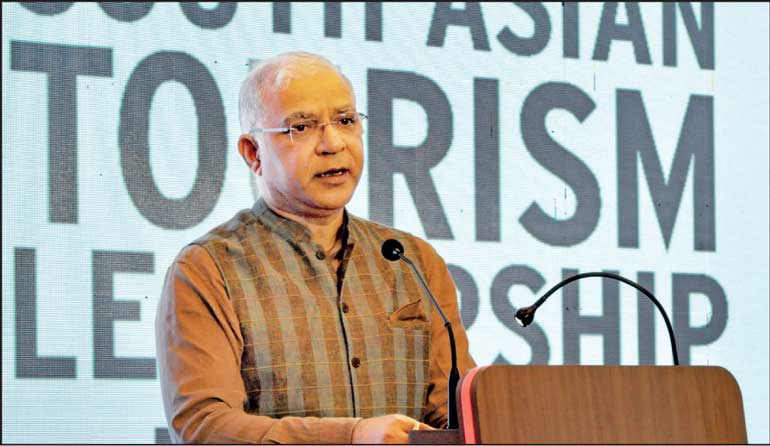Wednesday Feb 25, 2026
Wednesday Feb 25, 2026
Saturday, 9 November 2024 00:43 - - {{hitsCtrl.values.hits}}

Indian High Commissioner to Sri Lanka Santhosh Jah
– Pic by Lasantha Kumara
By Charumini de Silva
Indian High Commissioner to Sri Lanka Santhosh Jah yesterday called for stronger tourism links between the two countries. Speaking as the Chief Guest at the inaugural South Asian Tourism Leadership Forum titled, ‘Designing Experiences; Enhancing Sri Lanka’s Luxury Travel Offer’ of the Sri Lanka Design Festival 2024, he emphasised India’s significant contribution in Sri Lanka’s tourism sector and its potential to drive economic growth.
“In 2023, around 20% of total visitors to Sri Lanka were from India,” he said, adding that this figure has room for significant growth as both countries deepen ties and expand connectivity.
The High Commissioner opined robust infrastructure, digital integration and targeted promotions could elevate Sri Lanka’s position as a premier destination for Indian travellers, while also enhancing local employment and foreign exchange earnings.
“Opportunity lies in tapping into the strong market of India,” the High Commissioner said, as the country is about to cross one million individuals with over $ 1 million.
India remains Sri Lanka’s single biggest source market, with 330,758 tourists’ year-to-date (YTD). This robust contribution has also helped to maintain employment of around 200,000 direct and 300,000 indirect employments with the sector remaining the third largest source of foreign exchange earnings for the economy.
Jah expressed confidence in expanding these numbers further, supported by both Governmental and private sector efforts to enhance infrastructure and connectivity.
The High Commissioner also highlighted India’s efforts to promote Sri Lanka as a destination, pointing to a widely shared social media endorsement by India’s External Affairs Minister Dr. S. Jaishankar, urging Indians to vacation in Sri Lanka.
“It is quite extraordinary for a foreign leader to encourage his own citizens to holiday outside their homeland, exemplifying the warmth of our relationship,” he emphasised.
The High Commissioner also cited specific growth areas beyond traditional tourism. “The Buddhist Circuit and the Ramayana Trail, pilgrimage routes have significant cultural resonance for Indian travellers,” he pointed out.
He encouraged investment in local tourism infrastructure to accommodate the potential influx, noting India’s Ayodhya temple as an example.
“If just 1% of its 400,000 daily visitors came to Sri Lanka, it would mark a dramatic boost in arrivals,” he said.
Jah also asserted connectivity remains a key priority for both nations, with 250 flights currently linking Indian and Sri Lankan cities, including direct flights between Chennai and Jaffna.
However, he advocated for further development, including expanding Jaffna’s Palali Airport, which could act as a gateway for non-Indian tourists travelling via India, thereby diversifying Sri Lanka’s visitor base and fuelling the North and East region’s untapped tourism potential.
The High Commissioner also touched on the financial front, where he suggested further promotion of India’s Universal Payment Interface (UPI), which allows Indian travellers to make digital payments in Indian rupees. “This initiative requires greater local promotion. The integration would simplify travel logistics for Indian visitors, potentially boosting spending and enhancing the overall experience,” he said.
Noting that India owns the wedding and event industry worth over $ 130 billion, the High Commissioner suggested Sri Lanka’s scenic venues as ideal for hosting a portion of the 4.8 million weddings expected across India in the coming weeks.
Jah also underscored the imperative of digital and infrastructure investments. “Tourism can become a very strong reason to reinforce the people-to-people connections and deep cultural bonds shared by the two countries. Our heart is in it,” he said.
Describing the bilateral relationship as ‘civilisational twins’, he emphasised that the long-standing bond between the two nations goes beyond transactional diplomacy, focusing instead on a profound cultural and strategic connection.
“Our perspectives, when we look at the world in the very long term, are strategic and civilisational. India and Sri Lanka share a unique and spontaneous fraternal relationship rooted in mutual respect and share cultural heritage. We hope Sri Lanka reciprocates the same spirit as India,” he added.